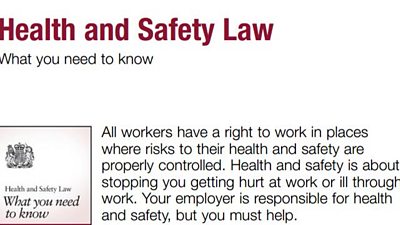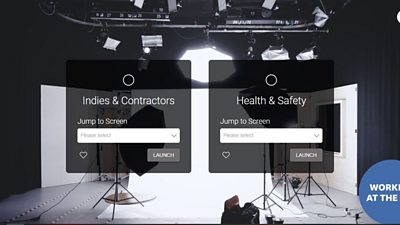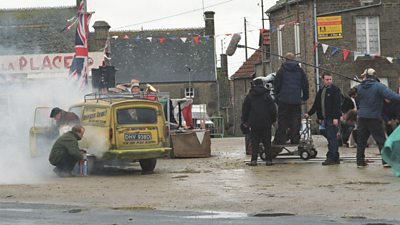Competence can be described as the skills, knowledge and experience that a person has and how they use these to perform the tasks / activities required of them to an appropriate standard, and thereby helping them discharge their safety responsibilities.
Developing competence in safety (through training and experience) is good for the person, for the team and for the organisation, and will lead to improved safety performance.
Induction for All
- All new starters to the ΒιΆΉΤΌΕΔ should be inducted to their workplace within the first few days of arrival to make sure they understand the safety basics such as fire escape procedures, first aid, accident reporting and security arrangements (see ΒιΆΉΤΌΕΔ Induction Form in Related Topics)
- All new starters to the ΒιΆΉΤΌΕΔ should also complete the Upfront sessions (see Recommended Links (Gateway))
- All new starters (including current workers moving to new departments / workplaces) must be inducted on the risk assessments and/or safety precautions that relate to their work activities, as well as complete any necessary induction training courses (e.g. NBH Fire Safety Induction following a move to NBH (see Safety-Related Training courses in Useful Documents)).
Mandatory / Job-specific Training
- All staff should complete relevant (see also Safety-Related Training courses in Useful Documents). Mandatory training should be completed prior to being exposed to, or to managing, relevant safety risks.
- Some job roles have specific safety competency criteria e.g. Managing Events safely, First Aider, etc. and the Academyβs training courses aim to address these
- Where the competency standard required of an individual cannot be provided through internally co-ordinated training courses, these must be sought by suitable external training providers (ΒιΆΉΤΌΕΔ Academy and ΒιΆΉΤΌΕΔ Safety can help source such providers). This training may include qualifications needed to meet legislative requirements and industry standards for a given job role / activity (e.g. Hostile Environments, electrician, Divemaster, etc.) β where available, ΒιΆΉΤΌΕΔ Safety Guidelines describe the required competency standards
- To maintain safety standards, competence requirements for a given appointment or task should be clearly defined in, and appended to, risk assessments. Where such qualifications / certification are required (by law and/or by ΒιΆΉΤΌΕΔ Guidelines), records must be checked prior to appointment to ensure they remain βin-dateβ throughout the job. Where appropriate, this checking may require the review of logbooks kept to satisfy continuing professional development (CPD).
Managing Safety
Managers have an important role in the safety of their teams - they are involved in planning processes and risk assessments, they supervise the actions of others, and they are often the point of contact if things go wrong.
- Competence / safety performance must be a central element in the recruitment process, and managers need to be able to define the competency standards required for those that work under them
- Competence / safety performance should be part of all of our personal performance objectives through the PDR process, identifying gaps in team / personal skills and knowledge, and steering continuing personal development plans through appropriate training
- Managers should familiarise themselves with the safety support services available to help them
- Managers at Band 10 and above can hone their safety management skills through the Safety Leadership course (see Recommended Links (Gateway))
- Managers wishing to develop further their safety competence should consider professional courses / qualifications awarded by the Institute of Occupational Safety and Health (see Recommended Links).
Freelancers
- In general, ΒιΆΉΤΌΕΔ training courses are not available to freelancers engaged on a self-employed basis - they are expected to arrange for and pay for themselves any training and up-skilling they need to be able to perform the job required of them competently
- The exceptions to this can be where the training courses are either considered βorientationβ (i.e. required to understand ΒιΆΉΤΌΕΔ-specific processes) or βmandatoryβ (which includes some safety training)
- When engaging freelancers, productions must check their competence, including with regard to assessing and managing the safety risks they will be responsible for. Production Safety Passport (PSP) training courses (see Recommended Links (www)) are accepted across the TV / Radio production industry and, providing they will remain βin-dateβ throughout the production run, will not need to be repeated during their time with us. Freelancers can assist productions to access their PSP training records by registering with Hiive (see Recommended Links)
- Where the freelancer is required to complete mandatory safety training, their contracting department should build it into their schedule of work and it should be completed prior to them commencing location work. The freelancerβs time for this training is only to be considered paid βworking timeβ if they complete it during an existing contract period β freelancers should not be brought in and paid to attend such training out of contract
- Freelancers should co-operate with the production to undergo the mandatory training required of them by the ΒιΆΉΤΌΕΔ β noting that PSP face-to-face courses are scheduled by training providers for the benefit of all and are not generally available βon demandβ. Online courses may not provide an adequate substitute for PSP courses. Any issues should be referred to local Managers, ΒιΆΉΤΌΕΔ Safety and the ΒιΆΉΤΌΕΔ Academy.
Further information on Working with Freelancers is available in our safety guideline (see Related Topics).
Third Parties
We rely on external people to help us carry out our work - freelancers, contributors, contractors and independent production companies β and their competence is an essential part of ensuring good safety performance in all that we do and portray. Details on how to select and appoint competent third parties are given in our relevant Safety Guidelines (see related Topics).
H&S Assistance
It is a statutory requirement of all employers to engage one or more competent persons to advise them on the measures needed to comply with UK safety law β within the ΒιΆΉΤΌΕΔ, this role is provided by ΒιΆΉΤΌΕΔ Safety. The numbers and competence of those employed in this role needs to be proportionate to the size and complexity of the organisation, the risks involved and the distribution of those risks throughout the places where the organisation works.
- The ΒιΆΉΤΌΕΔ must maintain a source of competent safety advice which is able to adequately support the business in all areas where the ΒιΆΉΤΌΕΔ works
- The source of competent safety advice must set and maintain appropriate standards of competence in those that it appoints to provide safety support to the organisation, and manage their delivery to help mitigate safety risks in the business.
Division Specific Issues
- Incorporating Radio OB MS D001-09 Competence.
Useful links
-
-
-
-
H&S training scheme from ScreenSkills
-
Finding a course and a training provider
-
Qualifications awarded by the Institute of Occupational Safety and Health (IOSH)
-
Health and Safety Executive
General safety topics
More from SSR
-
Your platform to record accidents, risk assessments, assurance monitoring and inspections
-
Safety Equipment Stores
Just one number to call: 020 3614 5155 -
ΒιΆΉΤΌΕΔ Safety Guidelines
An A-Z of ΒιΆΉΤΌΕΔ's Health and Safety Guidelines -
Safety Advice Line: 0370 411 0464 Email: safety@bbc.co.uk
- A-Z of ΒιΆΉΤΌΕΔ Safety Guidelines
- Accident Reporting and Investigation
- ΒιΆΉΤΌΕΔ Health & Safety Policy
- Contractors (incl. vetted lists)
- Contributors
- Fire Safety
- Freelancers
- Independent Production Companies
- Risk Assessment
- Safety Alerts
- Safety Responsibilities
- Safety Training
- Sets & Premises Safety Guide
Events guidance - key links:
- Exhibitions
- General Guidance
- Indoor Location Recce Checklist
- Outdoor Location Recce Checklist
- Major Incidents & Emergency Planning
- Marketing and Promotional
- Noise Exposure
- Planning and Management
- Responsibilities
- Responsibilities Form
- Laser Lighting Effects
- Strobe Lighting
- Temporary Stages and Rostra
Health topics - key links:
- (ΒιΆΉΤΌΕΔ network only)
- Contributors Fitness to Participate
- Display Screen Equipment (DSE)
- (ΒιΆΉΤΌΕΔ network only)
- First Aid and Welfare on Location
- International Travel - Risks & Health
- Manual Handling
- Mental Health: ΒιΆΉΤΌΕΔpage
- (ΒιΆΉΤΌΕΔ network only)
- Personal Health and Wellbeing
- Pregnancy
- Psychological Trauma Support & Trauma Risk Management (TRiM)
- Tiredness and Fatigue
- Travel Health Contacts
ΒιΆΉΤΌΕΔ High Risk - key links:
- CBRN and Industrial Spills
- Covert Filming
- Crisis Management and Security Support
- Demonstrations, Protests and Crowds
- Disaster Coverage
- Door Stepping
- (ΒιΆΉΤΌΕΔ network only)
- (ΒιΆΉΤΌΕΔ network only)
- Public Order
- Safety Equipment Stores
ΒιΆΉΤΌΕΔ Journalism - key links:
ΒιΆΉΤΌΕΔ Productions - key links:
- Aerial Filming and Airfields
- Animals: Displaying and handling for performance
- Boats: Working on
- Children and Young People
- Driving
- Electrical Equipment and Systems
- First Aid and Welfare on Location
- Food Safety (Cooking and Catering)
- Remote Location Working
- Roads and Streets: Working by
- Security of Productions on Location
- Stunts
- Tiredness and Fatigue
- Unmanned Aerial Systems (UAS aka Drones)
- Vehicles: Recording in, from and around
- Working at Height: Mobile Elevating Work Platforms
- Working at Height: Tower Scaffolds
ΒιΆΉΤΌΕΔ Radio - key links:
- (ΒιΆΉΤΌΕΔ Network only)
ΒιΆΉΤΌΕΔ Security - key links:
ΒιΆΉΤΌΕΔ Sport - key links:
About this site
This site describes what the ΒιΆΉΤΌΕΔ does in relation to managing its health, safety and security risks and is intended for those who work directly for the ΒιΆΉΤΌΕΔ.
It is not intended to provide instruction or guidance on how third parties should manage their risks. The ΒιΆΉΤΌΕΔ cannot be held liable for how this information is interpreted or used by third parties, nor provide any assurance that adopting it would provide any measure of legal compliance. More information
Some links on this site are only accessible when connected to the ΒιΆΉΤΌΕΔ network














